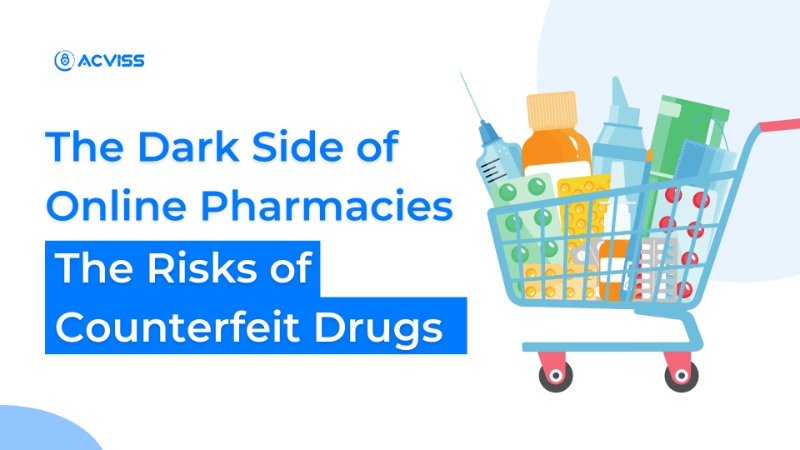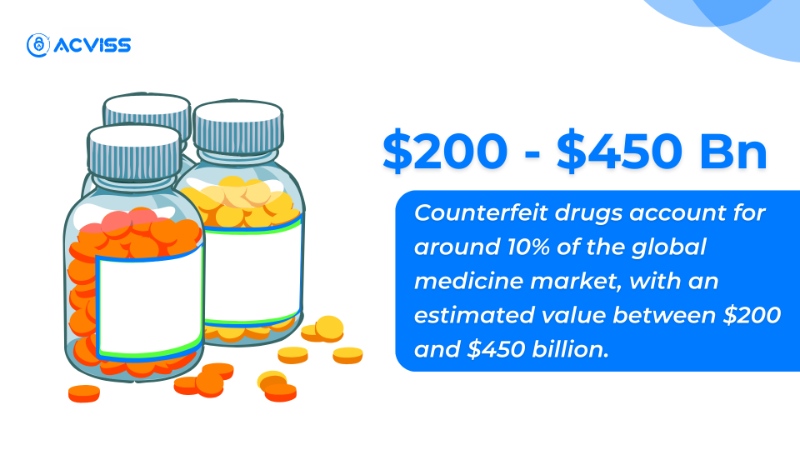The Dark Side of Online Pharmacies: The Risks of Counterfeit Drugs

Isn't it amazing how the internet has changed the way we live and access information? From shopping to ordering food, we can get almost everything online these days, including medications. But, there's a dark side to this convenience that we need to be aware of - the risks of counterfeit drugs. These fake or substandard medications can seriously harm patients and even cause death. It's quite alarming that selling counterfeit pharmaceutical products through online platforms has become a growing concern for both health authorities and consumers. This illicit activity not only puts the lives of patients at risk but also compromises public health and undermines the pharmaceutical industry's efforts to promote safe and effective treatments.
The Prevalence of Counterfeit Drugs
Counterfeit drugs have now become a global problem. According to the World Health Organization (WHO), counterfeit drugs account for around 10% of the global medicine market, with an estimated value between $200 and $450 billion. The majority of these products are sold through online platforms. This trend has been exacerbated by the COVID-19 pandemic, which has led to an increase in online sales of medical products, including vaccines and treatments. Counterfeit drugs can be found in every region of the world, and their prevalence is increasing. In some countries, the percentage of counterfeit drugs is even higher, with estimates ranging from 10% to 30%.
Where does India stand?
India, like many other countries, has been facing a growing problem of counterfeit medicines sold online. According to reports, India is among the top countries in the world for the production and distribution of fake medicines. A study by the Authentication Solution Providers’ Association (ASPA) found that India has witnessed an increase of 47% in counterfeit medicines sold in the country. Counterfeit medicines are often sold online through illegitimate pharmacies or unregulated online marketplaces, with many of these products originating from unlicensed manufacturers in India and neighbouring countries. These products are often cheaper than legitimate medicines, making them attractive to consumers who are trying to save money. This issue poses a significant threat to public health and development of the society.
In 2017, MedplusMart.com, an online pharmacy based in Hyderabad was shut down by the Telangana Drug Control Administration (DCA) which cancelled the license of MedplusMart.com for violating drug sale rules. Another instance is the case of Snapdeal, an Indian e-commerce website that was found to be selling prescription drugs without a valid license. In 2015, the Drugs Controller General of India (DCGI) filed a complaint against Snapdeal, and the company was ordered to stop selling prescription drugs on its platform.
The Dangers of Online Pharmacies
Online pharmacies have become a popular way for patients to purchase medications. However, not all online pharmacies are legitimate. In fact, many online pharmacies sell counterfeit drugs, putting patients at risk. The dangers of online pharmacies include:
Lack of regulation
Online pharmacies are not regulated in the same way as traditional pharmacies. This means that the drugs they sell may not be safe or effective.
Lack of authentication
Not able to authenticate the source of their drugs, leading to the sale of counterfeit drugs.
Poor quality control
Online pharmacies may not have the same quality control standards as traditional pharmacies, leading to the sale of substandard drugs.
Limited patient information
These online marketplaces may not have access to patients' medical histories or other important information, leading to improper treatment or prescription of drugs.
How to Protect Yourself from Counterfeit Drugs
The Indian government has taken several steps to combat the sale of counterfeit medicines online, including implementing stricter regulations for online pharmacies and increasing surveillance of the market. In 2018, the Central Drugs Standard Control Organization (CDSCO) introduced new guidelines for e-pharmacies, requiring them to be registered and comply with certain standards, such as maintaining proper records of medicines sold and verifying prescriptions.Operation Pangea XI is an international operation to crack down on the illegal online sale of medicines. As a result of this operation, the authorities shut down over 1 lakh fraudulent websites and social media links for illegal online pharmacies and seized more than $20 million worth of fake drugs that were sold worldwide.
Although the authorities have been tirelessly working to stop the illicit trade, we as consumers must check for authenticity before engaging with the online pharma markets.
Buy from a reputable source : When purchasing medications, make sure to buy from a reputable source, such as a licensed pharmacy or a pharmacy accredited by a recognized organization, such as the Central Drugs Standard Control Organization (CDSCO).
Verify the pharmacy's license : Before purchasing online, verify the pharmacy's license with the state board of pharmacy or the equivalent regulatory agency in your country.
Suspiciously low prices : Counterfeit drugs are often sold at prices significantly lower than the market price. Be wary of prices that seem too good to be true.
Signs of authenticity : Check the packaging, labelling, and physical characteristics of the medication for signs of authenticity, such as security hologram stickers, unique serial numbers, and tamper-evident packaging labels. This can provide you with further information about the manufacturer of the product.

Counterfeit drugs are a serious threat to public health, and the rise of online pharmacies has made it easier for counterfeit drugs to enter the supply chain. It is crucial that measures are taken to ensure that patients have access to safe and effective treatments. By working together, health authorities, law enforcement agencies, and the pharmaceutical industry can help prevent the sale of counterfeit pharmaceuticals and protect public health.